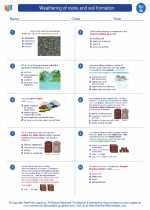Weathering of rocks and soil formation -> excretion
Process of Excretion
Excretion involves the removal of waste products and harmful substances from the body. This process occurs through several mechanisms including:- Urination: The kidneys filter waste products from the blood to produce urine, which is then excreted from the body through the urinary system.
- Defecation: Solid waste products are eliminated from the body through the process of defecation, which involves the expulsion of feces from the digestive system.
- Perspiration: The skin plays a role in excretion by eliminating certain waste products through sweat glands.
- Respiration: The lungs remove carbon dioxide, a waste product of cellular respiration, from the body during the process of breathing.
Organs Involved in Excretion
Several organs play a key role in the process of excretion:- Kidneys: The kidneys filter waste products from the blood and regulate the balance of fluids and electrolytes in the body.
- Urinary Bladder: This organ stores urine before it is excreted from the body through the process of urination.
- Large Intestine: Solid waste products are stored in the large intestine before being eliminated through the process of defecation.
- Skin: Sweat glands in the skin help eliminate certain waste products through the process of perspiration.
- Lungs: The lungs remove carbon dioxide, a waste product of cellular respiration, from the body during the process of breathing.
Importance of a Healthy Excretory System
Maintaining a healthy excretory system is essential for overall health and well-being. Some key reasons why the excretory system is important include:- Waste Removal: The excretory system helps remove waste products and toxins from the body, preventing the build-up of harmful substances.
- Fluid Balance: The kidneys help regulate the balance of fluids and electrolytes in the body, which is important for maintaining proper hydration and bodily functions.
- Acid-Base Balance: The excretory system helps regulate the pH balance of the body, ensuring that the blood and other bodily fluids maintain the appropriate acidity or alkalinity.
- Metabolic Waste Removal: Waste products generated through metabolic processes, such as urea and carbon dioxide, are efficiently removed from the body through the excretory system.
◂Science Worksheets and Study Guides Seventh Grade. Weathering of rocks and soil formation
Study Guide Weathering of rocks and soil formation
Weathering of rocks and soil formation  Activity Lesson
Activity Lesson Weathering of Rocks
Weathering of Rocks  Worksheet/Answer key
Worksheet/Answer key Weathering of rocks and soil formation
Weathering of rocks and soil formation  Worksheet/Answer key
Worksheet/Answer key Weathering of rocks and soil formation
Weathering of rocks and soil formation  Worksheet/Answer key
Worksheet/Answer key Weathering of rocks and soil formation
Weathering of rocks and soil formation  Worksheet/Answer key
Worksheet/Answer key Weathering of rocks and soil formation
Weathering of rocks and soil formation  Vocabulary/Answer key
Vocabulary/Answer key Weathering of rocks and soil formation
Weathering of rocks and soil formation  Vocabulary/Answer key
Vocabulary/Answer key Weathering of rocks and soil formation
Weathering of rocks and soil formation  Vocabulary/Answer key
Vocabulary/Answer key Weathering of rocks and soil formation
Weathering of rocks and soil formation  Vocabulary/Answer key
Vocabulary/Answer key Weathering of rocks and soil formation
Weathering of rocks and soil formation 

 Activity Lesson
Activity Lesson
 Worksheet/Answer key
Worksheet/Answer key
 Worksheet/Answer key
Worksheet/Answer key
 Worksheet/Answer key
Worksheet/Answer key
 Worksheet/Answer key
Worksheet/Answer key
 Vocabulary/Answer key
Vocabulary/Answer key
 Vocabulary/Answer key
Vocabulary/Answer key
 Vocabulary/Answer key
Vocabulary/Answer key
 Vocabulary/Answer key
Vocabulary/Answer key

The resources above cover the following skills:
LIFE SCIENCE
Unity and Diversity
Analyze and interpret data for patterns of change in anatomical structures of organisms using the fossil record and the chronological order of fossil appearance in rock layers.